湖北省博士英语联考大纲(非英语专业)
2024年博士研究生入学考试英语考试大纲

2024年博士研究生入学考试英语考试大纲2024 Doctoral Graduate Entrance Examination English Exam OutlineI. Listening ComprehensionThis section of the exam will test the candidates' ability to understand spoken English in academic and professional settings. Candidates will listen to a series of recordings, including lectures, conversations, and presentations, and answer multiple-choice questions based on the content. The topics will cover a wide range of subjects relevant to doctoral studies, such as research methods, literature reviews, and academic discussions.II. Reading ComprehensionIn this section, candidates will read academic texts, including scholarly articles, research papers, and book excerpts, and answer questions to demonstrate their understanding of the content. The passages will be of varying lengths and complexity, requiring candidates to identify main ideas, supporting details, and logical relationships within the text.III. Writing SkillsCandidates will be required to demonstrate their ability to write coherent and well-structured essays on a variety of topics related to their field of study. This section will test candidates' proficiency in academic writing, including the ability to formulate clear arguments, provide evidence to support their claims, and organize their ideas in a logical manner. Candidates may be asked to analyze a case study, evaluate a research question, or propose a research methodology.IV. Vocabulary and GrammarThis section will assess candidates' knowledge of vocabulary and grammar in academic English. Candidates will be tested on their ability to use complex vocabulary and grammar structures accurately and appropriately in written and spoken English. This section may include exercises on word meaning, word usage, sentence structure, and grammatical rules.V. Speaking SkillsCandidates will be required to engage in conversations and discussions on academic topics with examiners. This section will test candidates' ability to express ideas clearly and coherently, respond to questions, and engage in academic discourse. Candidates will be evaluated on their fluency, pronunciation, vocabulary usage, and grammar accuracy.Overall, the 2024 Doctoral Graduate Entrance Examination English Exam is designed to assess candidates' readiness for doctoral studies by evaluating their listening, reading, writing, speaking, vocabulary, and grammar skills in academic English. Candidates are encouraged to prepare thoroughly for the exam by practicing listening and reading comprehension, academic writing, vocabulary building, and speaking skills in English. Good luck to all the candidates!。
(word完整版)武汉理工考博英语
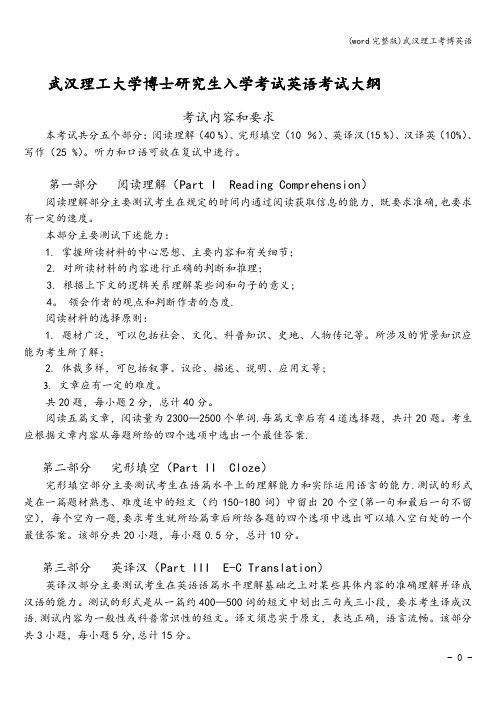
武汉理工大学博士研究生入学考试英语考试大纲考试内容和要求本考试共分五个部分:阅读理解(40 %)、完形填空(10 %)、英译汉(15 %)、汉译英(10%)、写作(25 %)。
听力和口语可放在复试中进行。
第一部分阅读理解(Part I Reading Comprehension)阅读理解部分主要测试考生在规定的时间内通过阅读获取信息的能力,既要求准确,也要求有一定的速度。
本部分主要测试下述能力:1. 掌握所读材料的中心思想、主要内容和有关细节;2. 对所读材料的内容进行正确的判断和推理;3. 根据上下文的逻辑关系理解某些词和句子的意义;4。
领会作者的观点和判断作者的态度.阅读材料的选择原则:1. 题材广泛,可以包括社会、文化、科普知识、史地、人物传记等。
所涉及的背景知识应能为考生所了解;2. 体裁多样,可包括叙事、议论、描述、说明、应用文等;3.文章应有一定的难度。
共20题,每小题2分,总计40分。
阅读五篇文章,阅读量为2300—2500个单词.每篇文章后有4道选择题,共计20题。
考生应根据文章内容从每题所给的四个选项中选出一个最佳答案.第二部分完形填空(Part II Cloze)完形填空部分主要测试考生在语篇水平上的理解能力和实际运用语言的能力.测试的形式是在一篇题材熟悉、难度适中的短文(约150-180词)中留出20个空(第一句和最后一句不留空),每个空为一题,要求考生就所给篇章后所给各题的四个选项中选出可以填入空白处的一个最佳答案。
该部分共20小题,每小题0.5分,总计10分。
第三部分英译汉(Part III E-C Translation)英译汉部分主要测试考生在英语语篇水平理解基础之上对某些具体内容的准确理解并译成汉语的能力。
测试的形式是从一篇约400—500词的短文中划出三句或三小段,要求考生译成汉语.测试内容为一般性或科普常识性的短文。
译文须忠实于原文,表达正确,语言流畅。
该部分共3小题,每小题5分,总计15分。
全国硕士研究生招生考试英语(二)考试大纲(非英语专业)
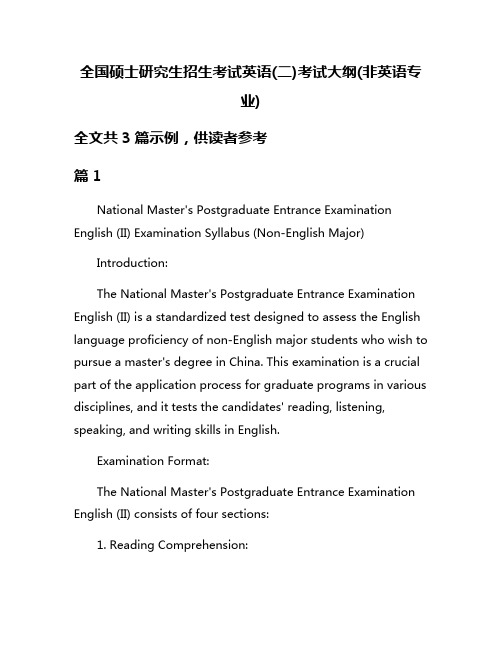
全国硕士研究生招生考试英语(二)考试大纲(非英语专业)全文共3篇示例,供读者参考篇1National Master's Postgraduate Entrance Examination English (II) Examination Syllabus (Non-English Major)Introduction:The National Master's Postgraduate Entrance Examination English (II) is a standardized test designed to assess the English language proficiency of non-English major students who wish to pursue a master's degree in China. This examination is a crucial part of the application process for graduate programs in various disciplines, and it tests the candidates' reading, listening, speaking, and writing skills in English.Examination Format:The National Master's Postgraduate Entrance Examination English (II) consists of four sections:1. Reading Comprehension:This section assesses the candidates' ability to understand and analyze written texts. The candidates will be required to answer multiple-choice questions based on a series of passages on various topics, such as science, history, literature, and social issues.2. Listening Comprehension:In this section, the candidates will listen to a series of recordings and answer multiple-choice questions based on the content of the recordings. The recordings may include conversations, lectures, and news reports.3. Speaking:The speaking section evaluates the candidates' ability to express their ideas and opinions in English. The candidates will be asked to respond to prompts on various topics and engage in discussions with the examiners.4. Writing:The writing section tests the candidates' ability to write coherent and well-organized essays in English. The candidates will be required to write an essay on a given topic within a specified time limit.Preparation Strategies:To excel in the National Master's Postgraduate Entrance Examination English (II), candidates should adopt the following preparation strategies:1. Practice regularly: Candidates should practice reading, listening, speaking, and writing in English on a daily basis to improve their language skills.2. Familiarize themselves with the examination format: Candidates should understand the format of the examination and practice past papers to become familiar with the types of questions that may appear on the test.3. Expand their vocabulary: Candidates should learn new words and phrases in English to enhance their ability to understand and express themselves effectively.4. Seek feedback: Candidates should seek feedback from teachers, tutors, or peers to improve their language proficiency and address any weaknesses in their English skills.Conclusion:The National Master's Postgraduate Entrance Examination English (II) is an important test for non-English major students who aspire to pursue a master's degree in China. By preparing systematically and diligently for the examination, candidates canenhance their English language skills and improve their chances of success in the competitive application process for graduate programs.篇2National Master's Entrance Examination in English(Non-English Major) Exam OutlineI. IntroductionThe National Master's Entrance Examination in English (Non-English Major) is a standardized test designed to evaluate the English language proficiency of non-English major graduate students in China. The exam is an important criterion for admission to various master's programs in English-speaking countries or other programs that require English language proficiency.II. Exam ContentThe exam consists of four sections: listening, reading, writing, and speaking. Each section tests different language skills and abilities, allowing for a comprehensive evaluation of the candidate's English proficiency.1. Listening:The listening section assesses the candidate's ability to understand spoken English in various contexts, including academic lectures, conversations, and radio broadcasts. Candidates are required to answer multiple-choice questions based on the audio materials they hear.2. Reading:The reading section tests the candidate's comprehension of written English texts, such as academic articles, essays, and reports. Candidates are expected to answer questions that assess their ability to analyze and interpret the information presented in the texts.3. Writing:The writing section evaluates the candidate's ability to express ideas clearly and coherently in written English. Candidates are asked to write essays or reports on given topics, demonstrating their skills in argumentation, logic, and organization.4. Speaking:The speaking section examines the candidate's ability to communicate effectively in spoken English. Candidates are required to participate in conversations, role-plays, orpresentations, demonstrating their fluency, pronunciation, and accuracy in speaking.III. Exam FormatThe exam is conducted in a computer-based format, with different sections administered at specified times. Candidates are allotted a specific amount of time for each section, with breaks provided between sections to ensure optimal performance.IV. ScoringThe exam is scored on a scale from 0 to 100, with each section weighted differently. The final score is a composite of the scores obtained in each section, providing an overall assessment of the candidate's English proficiency level.V. PreparationTo prepare for the National Master's Entrance Examination in English (Non-English Major), candidates are advised to practice regularly and familiarize themselves with the exam format and content. They can use study materials, attend preparatory courses, or seek guidance from English language tutors to improve their language skills.In conclusion, the National Master's Entrance Examination in English (Non-English Major) is a crucial assessment that determines the English language proficiency of non-English major graduate students seeking admission to master's programs. By understanding the exam outline, content, format, scoring, and preparation strategies, candidates can effectively prepare for the exam and increase their chances of success.篇3National Master's Entrance Examination English (Part II) Syllabus (Non-English Major)1. Listening Comprehension (30%)Part A: Listen and select the best response to the question you hear. (5 points)Part B: Listen and choose the best answer to the question you hear. (10 points)Part C: Listen and choose the statement that best summarizes the passage you hear. (5 points)Part D: Listen and choose the correct speaker for each statement. (5 points)Part E: Listen and fill in the blanks with the missing information you hear. (5 points)2. Grammar and Vocabulary (30%)Part A: Choose the word or phrase that best completes the sentence. (10 points)Part B: Choose the word(s) or phrase(s) that best explain the underlined word(s) or phrase(s). (10 points)Part C: Choose the word(s) or phrase(s) that best fits the blank in the sentence. (10 points)3. Reading Comprehension (30%)Part A: Read the passage and answer the questions. (10 points)Part B: Read the passage and fill in the blanks with the correct words or phrases. (10 points)Part C: Read the passage and choose the statement that best summarizes the passage. (10 points)4. Writing (10%)Part A: Write an article on a given topic. (10 points)Total: 100 pointsNote: The above exam syllabus is subject to change based on the examination committee's decision. Candidates are advised to prepare thoroughly by practicing sample questions and familiarizing themselves with the exam format. Good luck with your preparation!。
博士生英语教学大纲
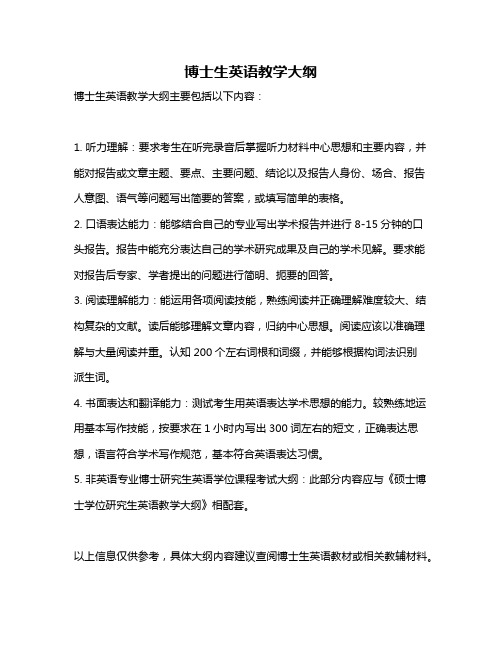
博士生英语教学大纲
博士生英语教学大纲主要包括以下内容:
1. 听力理解:要求考生在听完录音后掌握听力材料中心思想和主要内容,并能对报告或文章主题、要点、主要问题、结论以及报告人身份、场合、报告人意图、语气等问题写出简要的答案,或填写简单的表格。
2. 口语表达能力:能够结合自己的专业写出学术报告并进行8-15分钟的口头报告。
报告中能充分表达自己的学术研究成果及自己的学术见解。
要求能对报告后专家、学者提出的问题进行简明、扼要的回答。
3. 阅读理解能力:能运用各项阅读技能,熟练阅读并正确理解难度较大、结构复杂的文献。
读后能够理解文章内容,归纳中心思想。
阅读应该以准确理解与大量阅读并重。
认知200个左右词根和词缀,并能够根据构词法识别
派生词。
4. 书面表达和翻译能力:测试考生用英语表达学术思想的能力。
较熟练地运用基本写作技能,按要求在1小时内写出300词左右的短文,正确表达思想,语言符合学术写作规范,基本符合英语表达习惯。
5. 非英语专业博士研究生英语学位课程考试大纲:此部分内容应与《硕士博士学位研究生英语教学大纲》相配套。
以上信息仅供参考,具体大纲内容建议查阅博士生英语教材或相关教辅材料。
2022年 学位非英语专业公共课科目一《英语》考试大纲

福建师范大学申请成人高等教育学士学位考试非英语专业公共课《英语》课程考试大纲考试形式:线上考试考试时间:100分钟一、课程考试的性质及测试目标本课程考试的对象为自考、业余、函授、网络等各类成人教育的非英语专业本科毕业生。
本课程考试以教育部印发的《大学英语课程教学要求》为主要标准依据,充分考虑成人教育学生的特点,检测成人教育本科生是否达到该层次英语教学的要求。
根据大学英语教学要求,该课程的目的是培养学生具有较强的阅读能力、一定的翻译能力以及初步的写作能力,使学生能以英语为工具,获取专业所需要的信息,并为进一步提高英语水平打下较好的基础。
为此,本考试主要检测学生综合运用语言的能力,同时也考查学生对基本语法结构和词语用法方面的基础能力。
本考试旨在全面考核成人高等教育本科毕业生是否达到本考试大纲所规定的各项要求。
考生应掌握3500个单词和一定数量的词组的意义及基本用法,具备基本的实际运用语法的能力,能够阅读、翻译和写作一般题材的文字材料。
二、参考教材(考生自备)本课程指定教材为北京交通大学出版社出版的“现代远程教育系列教材”之《大学英语》(2014年3月第3版)一、二两册。
命题素材70%源于指定教材,30%源于课外,难易度与教材相当。
学士学位考试对语法与词汇、阅读理解、翻译、完型填空和写作等方面均有具体的要求。
三、分项要求1.词汇本考试词汇考核范围参照教育部高等教育司编写的《大学英语课程教学要求》(试行)词汇表中的3500个词汇(其中包括要求一般认知的2000个消极词汇和要求熟练掌握的1500个积极词汇),以及由这些词构成的常用词组(中学所掌握的单词和词组包括在内),要求考生至少掌握2000个积极词汇和50%的消极词汇,并具有按照基本构词法识别生词的能力。
上述指定教材中的词汇基本涵盖要求范围。
2.语法考生应能比较熟练地运用基本的语法知识,提高在语篇水平上运用语法知识的能力。
要求考生在语法、词汇、阅读、填词、翻译、写作等考核项目中,能结合上下文语境准确、灵活、自如地运用基本的词法、句法、篇章等语法知识进行规范的表达。
非英语专业研究生英语(第一外语)教学大纲
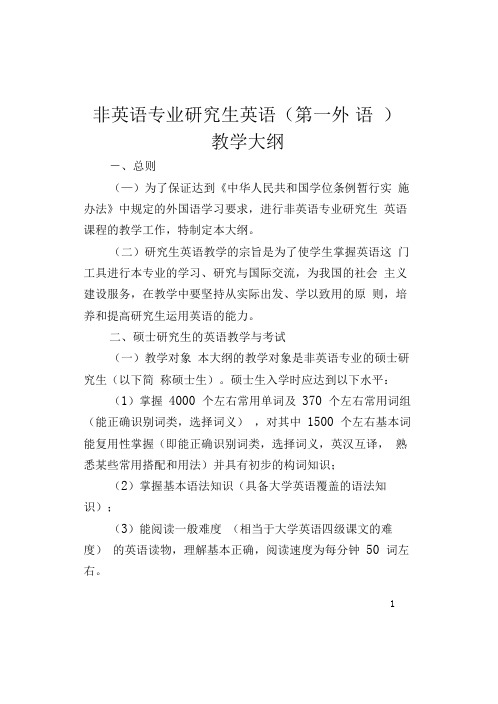
非英语专业研究生英语(第一外语)教学大纲-、总则(—)为了保证达到《中华人民共和国学位条例暂行实施办法》中规定的外国语学习要求,进行非英语专业研究生英语课程的教学工作,特制定本大纲。
(二)研究生英语教学的宗旨是为了使学生掌握英语这门工具进行本专业的学习、研究与国际交流,为我国的社会主义建设服务,在教学中要坚持从实际出发、学以致用的原则,培养和提高研究生运用英语的能力。
二、硕士研究生的英语教学与考试(一)教学对象本大纲的教学对象是非英语专业的硕士研究生(以下简称硕士生)。
硕士生入学时应达到以下水平:(1)掌握4000 个左右常用单词及370 个左右常用词组(能正确识别词类,选择词义),对其中1500 个左右基本词能复用性掌握(即能正确识别词类,选择词义,英汉互译,熟悉某些常用搭配和用法)并具有初步的构词知识;(2)掌握基本语法知识(具备大学英语覆盖的语法知识);(3)能阅读一般难度(相当于大学英语四级课文的难度)的英语读物,理解基本正确,阅读速度为每分钟50 词左右。
1(4)能将一般难度的英语短文译成汉语,理解基本正确,译文达意;能将一般难度的汉语句子译成英语,内容表达与语法基本正确;(5)具有初步的写作能力。
硕士生中有一定数量单独考试入学的学生,其入学水平亦应逐步达到上述要求。
(二)教学目的硕士生英语教学目的是培养学生具有较熟练的阅读能力,一定的写、译能力和基本的听、说能力,能够以英语为工具进行本专业的学习和研究。
对听、说能力要求较高的专业,可根据需要,加强听、说能力的培养。
(三)教学要求硕士生的英语教学包括基础英语和专业英语两部分。
1、基础英语部分(1)词汇理解性掌握5000个左右的常用单词及500 个左右常用词组,复用性掌握其中2000 个左右的基本词。
认知120 个左右常用词根和词缀,并能根据构词法识别派生词。
(2)语法能较熟练地运用语法知识,能理解语法结构复杂的长难句。
3)读掌握并能运用各项阅读技能(如概括中心思想,猜词语意,预见,推理和推论等),具有语篇水平上的分析能力。
非外语专业研究生英语教学大纲
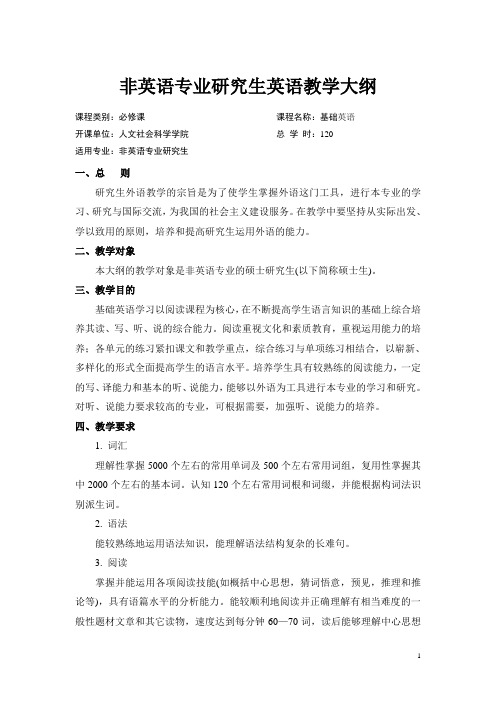
非英语专业研究生英语教学大纲课程类别:必修课课程名称:基础英语开课单位:人文社会科学学院总学时:120适用专业:非英语专业研究生一、总则研究生外语教学的宗旨是为了使学生掌握外语这门工具,进行本专业的学习、研究与国际交流,为我国的社会主义建设服务。
在教学中要坚持从实际出发、学以致用的原则,培养和提高研究生运用外语的能力。
二、教学对象本大纲的教学对象是非英语专业的硕士研究生(以下简称硕士生)。
三、教学目的基础英语学习以阅读课程为核心,在不断提高学生语言知识的基础上综合培养其读、写、听、说的综合能力。
阅读重视文化和素质教育,重视运用能力的培养;各单元的练习紧扣课文和教学重点,综合练习与单项练习相结合,以崭新、多样化的形式全面提高学生的语言水平。
培养学生具有较熟练的阅读能力,一定的写、译能力和基本的听、说能力,能够以外语为工具进行本专业的学习和研究。
对听、说能力要求较高的专业,可根据需要,加强听、说能力的培养。
四、教学要求1. 词汇理解性掌握5000个左右的常用单词及500个左右常用词组,复用性掌握其中2000个左右的基本词。
认知120个左右常用词根和词缀,并能根据构词法识别派生词。
2. 语法能较熟练地运用语法知识,能理解语法结构复杂的长难句。
3. 阅读掌握并能运用各项阅读技能(如概括中心思想,猜词悟意,预见,推理和推论等),具有语篇水平的分析能力。
能较顺利地阅读并正确理解有相当难度的一般性题材文章和其它读物,速度达到每分钟60—70词,读后能够理解中心思想及内容。
计时阅读难度略低、生词不超过总词数2%的材料,速度达到每分钟100—120词,读后能理解中心思想及主要内容。
4. 写作掌握基本写作技能(如文章结构、段落展开和起承转合等)。
能按具体要求,在1小时内写出250词左右的短文(如文章摘要和常用应用文等),正确表达思想,语意连贯,无重大语言错误。
5. 翻译1) 英译汉:能借助词典,将有相当难度的一般性题材文章译成汉语,理解正确,译文达意。
成人高等教育本科生学士学位英语水平考试大纲非英语专业
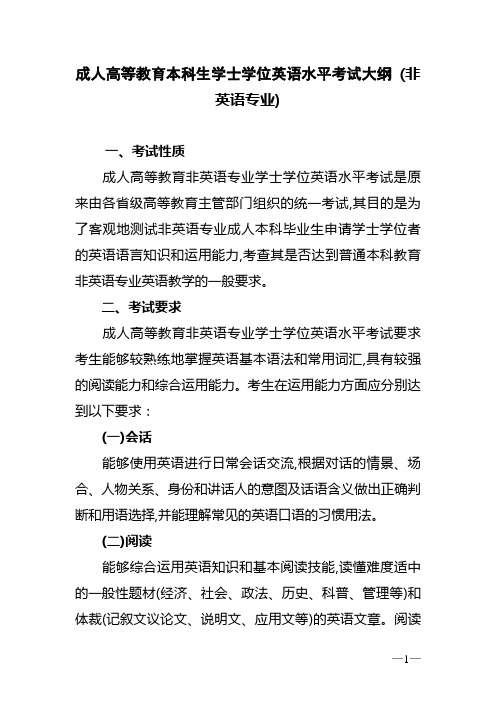
成人高等教育本科生学士学位英语水平考试大纲(非英语专业)一、考试性质成人高等教育非英语专业学士学位英语水平考试是原来由各省级高等教育主管部门组织的统一考试,其目的是为了客观地测试非英语专业成人本科毕业生申请学士学位者的英语语言知识和运用能力,考查其是否达到普通本科教育非英语专业英语教学的一般要求。
二、考试要求成人高等教育非英语专业学士学位英语水平考试要求考生能够较熟练地掌握英语基本语法和常用词汇,具有较强的阅读能力和综合运用能力。
考生在运用能力方面应分别达到以下要求:(一)会话能够使用英语进行日常会话交流,根据对话的情景、场合、人物关系、身份和讲话人的意图及话语含义做出正确判断和用语选择,并能理解常见的英语口语的习惯用法。
(二)阅读能够综合运用英语知识和基本阅读技能,读懂难度适中的一般性题材(经济、社会、政法、历史、科普、管理等)和体裁(记叙文议论文、说明文、应用文等)的英语文章。
阅读速度达到每分钟80个词。
具体要求为:1.能够掌握文章的中心思想、主要内容和细节;2.具备根据上下文把握词义的能力,理解上下文的逻辑关系;3.能够根据所读材料进行一定的推论;4.能够对文章的结构和作者的态度等做出一般的分析和判断。
(三)词汇掌握本考试大纲所规定的英语词汇、常用词组、常用词缀,并在阅读、写作等过程中具有相应的应用能力,即:1.领会式掌握4000个单词和500个常用词组;2.复用式掌握1800个左右的常用单词和搭配以及150个左右的常用词组;3.掌握一定数量的常用词缀,并能根据构词法和语境识别常见的派生词。
(四)语法掌握基本的英语语法知识,要求能在阅读、写作等过程中正确运用这些知识,达到正确理解、获取信息及表达思想的目的。
需要掌握的具体内容如下:1.名词、代词的数和格的构成及其用法;2.动词的基本时态、语态的构成及其用法;3.形容词、副词的比较级和最高级的构成及其用法;4.常用连接词、冠词的词义及其用法;5.非谓语动词(不定式、动名词、分词)的构成及其用法;6.虚拟语气的构成及其用法;7.各类从句的构成及其用法;8.基本句型的结构及其用法;9.强调句型的结构及其用法;10.常用倒装句的结构及其用法。
全国硕士研究生入学统一考试英语(二)考试大纲非英语专业2020年版
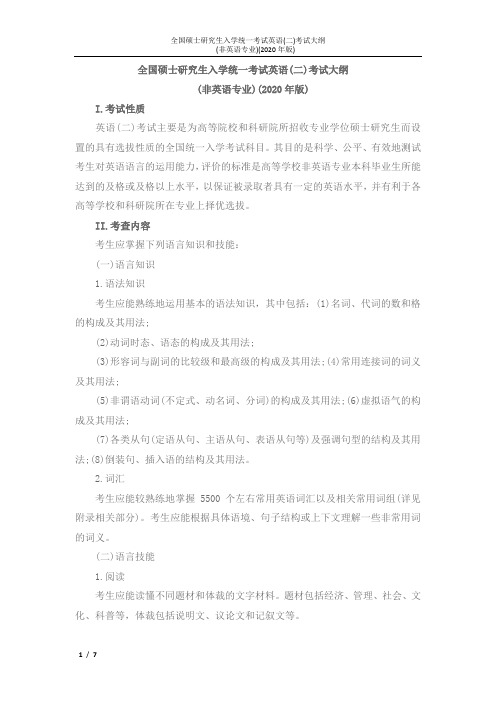
全国硕士研究生入学统一考试英语(二)考试大纲(非英语专业)(2020年版)I.考试性质英语(二)考试主要是为高等院校和科研院所招收专业学位硕士研究生而设置的具有选拔性质的全国统一入学考试科目。
其目的是科学、公平、有效地测试考生对英语语言的运用能力,评价的标准是高等学校非英语专业本科毕业生所能达到的及格或及格以上水平,以保证被录取者具有一定的英语水平,并有利于各高等学校和科研院所在专业上择优选拔。
II.考查内容考生应掌握下列语言知识和技能:(一)语言知识1.语法知识考生应能熟练地运用基本的语法知识,其中包括:(1)名词、代词的数和格的构成及其用法;(2)动词时态、语态的构成及其用法;(3)形容词与副词的比较级和最高级的构成及其用法;(4)常用连接词的词义及其用法;(5)非谓语动词(不定式、动名词、分词)的构成及其用法;(6)虚拟语气的构成及其用法;(7)各类从句(定语从句、主语从句、表语从句等)及强调句型的结构及其用法;(8)倒装句、插入语的结构及其用法。
2.词汇考生应能较熟练地掌握5500个左右常用英语词汇以及相关常用词组(详见附录相关部分)。
考生应能根据具体语境、句子结构或上下文理解一些非常用词的词义。
(二)语言技能1.阅读考生应能读懂不同题材和体裁的文字材料。
题材包括经济、管理、社会、文化、科普等,体裁包括说明文、议论文和记叙文等。
根据阅读材料,考生应能:(1)理解主旨要义;(2)理解文中的具体信息;(3)理解语篇的结构和上下文的逻辑关系;(4)根据上下文推断重要生词或词组的含义;(5)进行一定的判断和推理;(6)理解作者的意图、观点或态度。
2.写作考生应能根据所给的提纲、情景或要求完成相应的短文写作。
短文应中心思想明确、切中题意、结构清晰、条理清楚、用词恰当、无明显语言错误。
III.考试形式、考试内容与试卷结构(一)考试形式考试形式为笔试。
考试时间为180分钟。
满分为100分。
试卷包括试题册和1张答题卡。
2024全国博士英语考试大纲
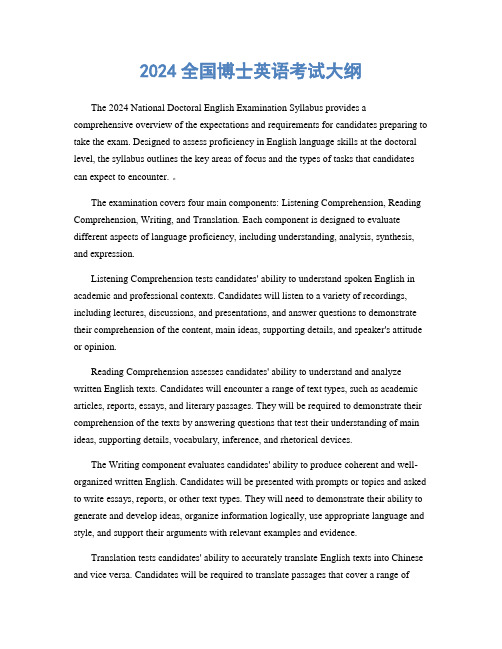
2024全国博士英语考试大纲The 2024 National Doctoral English Examination Syllabus provides a comprehensive overview of the expectations and requirements for candidates preparing to take the exam. Designed to assess proficiency in English language skills at the doctoral level, the syllabus outlines the key areas of focus and the types of tasks that candidates can expect to encounter. 。
The examination covers four main components: Listening Comprehension, Reading Comprehension, Writing, and Translation. Each component is designed to evaluate different aspects of language proficiency, including understanding, analysis, synthesis, and expression.Listening Comprehension tests candidates' ability to understand spoken English in academic and professional contexts. Candidates will listen to a variety of recordings, including lectures, discussions, and presentations, and answer questions to demonstrate their comprehension of the content, main ideas, supporting details, and speaker's attitude or opinion.Reading Comprehension assesses candidates' ability to understand and analyze written English texts. Candidates will encounter a range of text types, such as academic articles, reports, essays, and literary passages. They will be required to demonstrate their comprehension of the texts by answering questions that test their understanding of main ideas, supporting details, vocabulary, inference, and rhetorical devices.The Writing component evaluates candidates' ability to produce coherent and well-organized written English. Candidates will be presented with prompts or topics and asked to write essays, reports, or other text types. They will need to demonstrate their ability to generate and develop ideas, organize information logically, use appropriate language and style, and support their arguments with relevant examples and evidence.Translation tests candidates' ability to accurately translate English texts into Chinese and vice versa. Candidates will be required to translate passages that cover a range oftopics and genres, including academic, scientific, technical, and literary texts. They will need to demonstrate their understanding of both languages' grammar, vocabulary, and idiomatic expressions, as well as their ability to convey the original meaning and tone of the text.Overall, the 2024 National Doctoral English Examination Syllabus provides a clear outline of the expectations and requirements for candidates preparing to take the exam. By familiarizing themselves with the content and format of the exam, candidates can better prepare and improve their chances of success.。
2024专升本英语考纲湖北

2024专升本英语考纲湖北The 2024 Hubei Province English Syllabus for the Special Undergraduate ProgramAs the educational landscape in Hubei Province continues to evolve, the 2024 English syllabus for the Special Undergraduate Program has been meticulously designed to meet the needs of students aiming to advance their academic standing. This syllabus is a comprehensive guide thatoutlines the knowledge and skills students are expected to master in order to succeed in the competitive examination.The syllabus is divided into several key areas, each with its own set of learning objectives and assessment criteria. These areas include:1. Vocabulary and Grammar: Students are expected to havea robust vocabulary and a solid understanding of English grammar rules. The syllabus provides a list of essential words and phrases, as well as grammatical structures that must be mastered.2. Reading Comprehension: The ability to read and comprehend various types of texts, including narratives, expository texts, and argumentative essays, is a crucial part of the syllabus. Students will be tested on their ability to infer meaning, summarize content, and understand the author's purpose.3. Listening Skills: With an emphasis on developingactive listening skills, the syllabus includes a variety of listening exercises that simulate real-life scenarios, suchas conversations, lectures, and news broadcasts.4. Writing Skills: Writing is a significant component of the syllabus, focusing on both creative and analyticalwriting. Students will be expected to write essays, summaries, and reports, demonstrating their ability to organize thoughts coherently and express ideas effectively.5. Speaking Skills: The syllabus encourages the development of oral communication skills through group discussions, presentations, and role-plays. Students are assessed on their fluency, pronunciation, and the appropriate use of language in different contexts.6. Translation: Translation exercises are included totest students' ability to accurately convert English textinto Chinese and vice versa, reflecting their understandingof both languages' nuances.7. Cultural Awareness: The syllabus also incorporates elements of English-speaking cultures to broaden students' horizons and enhance their cultural competence.8. Test-taking Strategies: To prepare students for the exam, the syllabus includes guidance on effective test-taking strategies, such as time management and question analysis.The 2024 Hubei English syllabus is a blueprint for students to follow, ensuring that they are well-prepared for the challenges of the Special Undergraduate Program examination. It is designed to be flexible enough to accommodate different learning styles while maintaining a high standard of academic rigor.。
成人高等教育本科生学士学位英语水平考试大纲(非英语专业第二版)
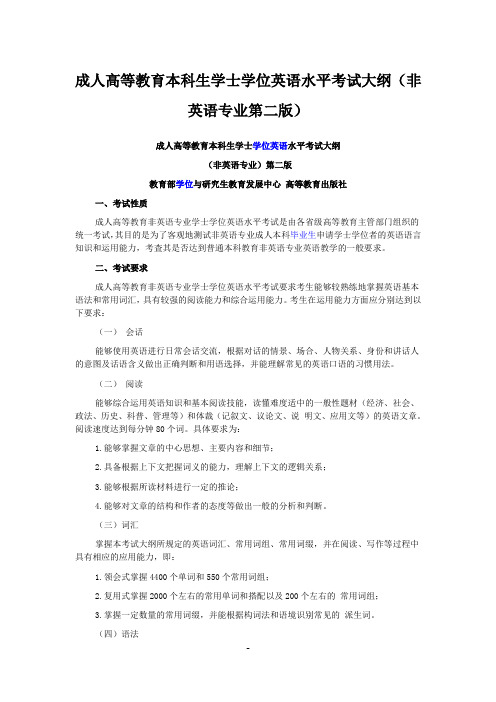
成人高等教育本科生学士学位英语水平考试大纲(非英语专业第二版)成人高等教育本科生学士学位英语水平考试大纲(非英语专业)第二版教育部学位与研究生教育发展中心高等教育出版社一、考试性质成人高等教育非英语专业学士学位英语水平考试是由各省级高等教育主管部门组织的统一考试,其目的是为了客观地测试非英语专业成人本科毕业生申请学士学位者的英语语言知识和运用能力,考査其是否达到普通本科教育非英语专业英语教学的一般要求。
二、考试要求成人高等教育非英语专业学士学位英语水平考试要求考生能够较熟练地掌握英语基本语法和常用词汇,具有较强的阅读能力和综合运用能力。
考生在运用能力方面应分别达到以下要求:(一)会话能够使用英语进行日常会话交流,根据对话的情景、场合、人物关系、身份和讲话人的意图及话语含义做出正确判断和用语选择,并能理解常见的英语口语的习惯用法。
(二)阅读能够综合运用英语知识和基本阅读技能,读懂难度适中的一般性题材(经济、社会、政法、历史、科普、管理等)和体裁(记叙文、议论文、说明文、应用文等)的英语文章。
阅读速度达到每分钟80个词。
具体要求为:1.能够掌握文章的中心思想、主要内容和细节;2.具备根据上下文把握词义的能力,理解上下文的逻辑关系;3.能够根据所读材料进行一定的推论;4.能够对文章的结构和作者的态度等做出一般的分析和判断。
(三)词汇掌握本考试大纲所规定的英语词汇、常用词组、常用词缀,并在阅读、写作等过程中具有相应的应用能力,即:1.领会式掌握4400个单词和550个常用词组;2.复用式掌握2000个左右的常用单词和搭配以及200个左右的常用词组;3.掌握一定数量的常用词缀,并能根据构词法和语境识别常见的派生词。
(四)语法掌握基本的英语语法知识,要求能在阅读、写作等过程中正确运用这些知识,达到正确理解、获取信息及表达思想的目的。
需要掌握的具体内容如下:1.名词、代词的数和格的构成及其用法;2.动词的基本时态、语态的构成及其用法;3.形容词、副词的比较级和最高级的构成及其用法;4.常用连接词、冠词的词义及其用法;5.非谓语动词(不定式、动名词、分词)的构成及其用法;6.虚拟语气的构成及其用法;7.各类从句的构成及其用法;8.基本句型的结构及其用法;9.强调句型的结构及其用法;10.常用倒装句的结构及其用法。
2024联考英语考纲

2024联考英语考纲一、语言知识本考试要求考生掌握的词汇量约为5500个单词及相关词组。
要求考生能够运用词汇理解和表达不同类型的话题,包括日常生活、学习、工作、人文、科技等方面。
考生需要了解英语语法的基本规则,能够正确理解和运用复杂句型,掌握一定的阅读和写作技巧。
二、语言技能1. 阅读理解:考生需要具备快速阅读、理解文章主旨、细节和推理的能力,能够根据上下文推测生词含义,理解作者观点和态度。
2. 写作:考生需要能够根据题目要求,撰写不同类型的应用文,包括信函、通知、便条等,同时还需要能够撰写议论文、说明文等不同类型的短文。
3. 听力:考生需要能够听懂日常生活和学术领域的一般性话题,并理解听力材料的主旨和要点。
4. 口语:考生需要能够运用基本的英语口语表达自己的观点和想法,包括日常生活、学习、工作等方面的内容。
三、考试形式与试卷结构1. 考试形式:本考试采用闭卷笔试形式,考试时间为120分钟,总分为100分。
2. 试卷结构:试卷分为四部分,分别为听力理解、阅读理解、写作和翻译。
每部分题型和分值如下:- 听力理解:20题,每题1分,共20分;- 阅读理解:30题,每题2分,共60分;- 写作:1题,共20分;- 翻译:1题,共20分。
四、能力要求本考试主要考察考生的英语综合能力,包括听、说、读、写、译五个方面。
要求考生在语言知识方面有一定的基础,掌握一定量的词汇和语法规则;在语言技能方面,要求考生能够熟练运用英语进行日常交流和表达思想;在考试形式与试卷结构方面,要求考生能够适应不同的题型和考试形式,掌握答题技巧。
五、内容要求本考试主要考察考生的英语语言水平和综合能力,不特定限制内容范围。
考生需要在规定的考试时间内完成听、说、读、写、译等方面的试题,并且要能够正确理解和表达相关的英语知识和技能。
全国硕士研究生入学统一考试英语(一)考试大纲(非英语专业)(2020年版)

I.考试性质英语(一)考试是为高等学校和科研院所招收硕士研究生而设置的具有选拔性质的全国统一入学考试科目,其目的是科学、公平、有效地测试考生对英语语言的运用能力,评价的标准是高等学校非英语专业本科毕业生所能达到的及格或及格以上水平,以保证被录取者具有一定的英语水平,并有利于各高等学校和科研院所在专业上择优选拔。
II.考查目标考生应掌握下列语言知识和技能:(一)语言知识1.语法知识考生应能熟练地运用基本的语法知识。
本大纲没有专门列出对语法知识的具体要求,其目的是鼓励考生用听、说、读、写的实践代替单纯的语法知识学习,以求考生在交际中能更准确、自如地运用语法知识。
2.词汇考生应能掌握5500左右的词汇以及相关附表中的内容(详见附录1、2)。
除掌握词汇的基本含义外,考生还应掌握词汇之间的词义关系,如同义词、近义词、反义词等;掌握词汇之间的搭配关系,如动词与介词、形容词与介词、形容词与名词等;掌握词汇生成的基本知识,如词源、词根、词缀等。
英语语言的演化是一个世界范围内的动态发展过程,它受到科技发展和社会进步的影响。
这意味着需要对本大纲词汇表不断进行研究和定期的修订。
此外,全国硕士研究生入学英语统一考试是为非英语专业考生设置的。
考虑到交际的需要,考生还应自行掌握与本人工作或专业相关的词汇,以及涉及个人好恶、生活习惯和宗教信仰等方面的词汇。
(二)语言技能1.阅读考生应能读懂选自各类书籍和报刊的不同类型的文字材料(生词量不超过所读材料总词汇量的3%),还应能读懂与本人学习或工作有关的文献资料、技术说明和产品介绍等。
对所选材料,考生应能:1)理解主旨要义;2)理解文中的具体信息;3)理解文中的概念性含义;4)进行有关的判断、推理和引申;5)根据上下文推测生词的词义;6)理解文章的总体结构以及上下文之间的关系;7)理解作者的意图、观点或态度;8)区分论点和依据。
2.写作考生应能写不同类型的应用文,包括私人和公务信函、备忘录、报告等,以及一般描述性、叙述性、说明性或议论性的文章。
英语一大纲
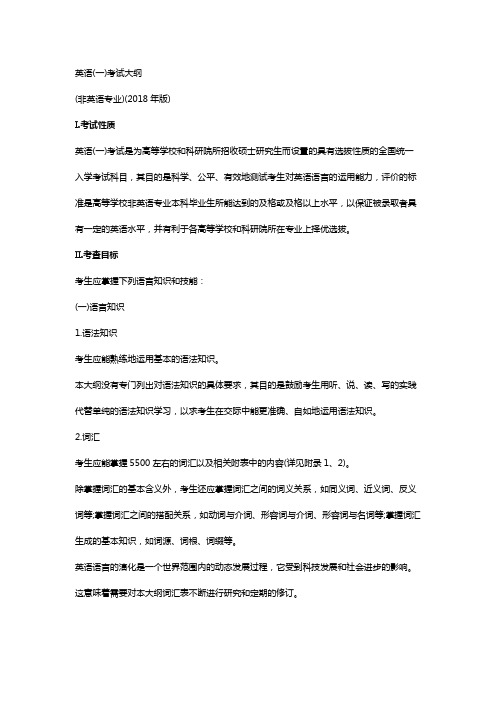
英语(一)考试大纲(非英语专业)(2018年版)I.考试性质英语(一)考试是为高等学校和科研院所招收硕士研究生而设置的具有选拔性质的全国统一入学考试科目,其目的是科学、公平、有效地测试考生对英语语言的运用能力,评价的标准是高等学校非英语专业本科毕业生所能达到的及格或及格以上水平,以保证被录取者具有一定的英语水平,并有利于各高等学校和科研院所在专业上择优选拔。
II.考查目标考生应掌握下列语言知识和技能:(一)语言知识1.语法知识考生应能熟练地运用基本的语法知识。
本大纲没有专门列出对语法知识的具体要求,其目的是鼓励考生用听、说、读、写的实践代替单纯的语法知识学习,以求考生在交际中能更准确、自如地运用语法知识。
2.词汇考生应能掌握5500左右的词汇以及相关附表中的内容(详见附录1、2)。
除掌握词汇的基本含义外,考生还应掌握词汇之间的词义关系,如同义词、近义词、反义词等;掌握词汇之间的搭配关系,如动词与介词、形容词与介词、形容词与名词等;掌握词汇生成的基本知识,如词源、词根、词缀等。
英语语言的演化是一个世界范围内的动态发展过程,它受到科技发展和社会进步的影响。
这意味着需要对本大纲词汇表不断进行研究和定期的修订。
此外,全国硕士研究生入学英语统一考试是为非英语专业考生设置的。
考虑到交际的需要,考生还应自行掌握与本人工作或专业相关的词汇,以及涉及个人好恶、生活习惯和宗教信仰等方面的词汇。
(二)语言技能①1.阅读考生应能读懂选自各类书籍和报刊的不同类型的文字材料(生词量不超过所读材料总词汇量的3%),还应能读懂与本人学习或工作有关的文献资料、技术说明和产品介绍等。
对所选材料,考生应能:1)理解主旨要义;2)理解文中的具体信息;3)理解文中的概念性含义;4)进行有关的判断、推理和引申;5)根据上下文推测生词的词义;6)理解文章的总体结构以及上下文之间的关系;7)理解作者的意图、观点或态度;8)区分论点和依据。
2.写作考生应能写不同类型的应用文,包括私人和公务信函、备忘录、报告等,以及一般描述性、叙述性、说明性或议论性的文章。
2024年医学考博英语统考大纲
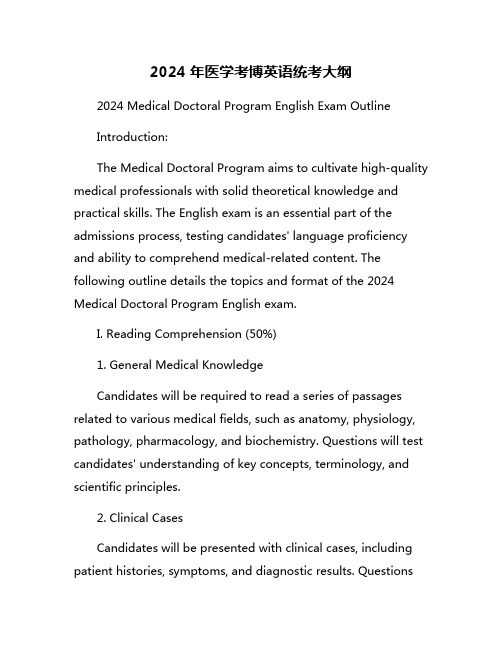
2024年医学考博英语统考大纲2024 Medical Doctoral Program English Exam OutlineIntroduction:The Medical Doctoral Program aims to cultivate high-quality medical professionals with solid theoretical knowledge and practical skills. The English exam is an essential part of the admissions process, testing candidates' language proficiency and ability to comprehend medical-related content. The following outline details the topics and format of the 2024 Medical Doctoral Program English exam.I. Reading Comprehension (50%)1. General Medical KnowledgeCandidates will be required to read a series of passages related to various medical fields, such as anatomy, physiology, pathology, pharmacology, and biochemistry. Questions will test candidates' understanding of key concepts, terminology, and scientific principles.2. Clinical CasesCandidates will be presented with clinical cases, including patient histories, symptoms, and diagnostic results. Questionswill assess candidates' ability to analyze and interpret medical information, identify potential diagnoses, and propose appropriate treatment plans.3. Medical ResearchCandidates will read research articles and studies on current medical topics and advancements. Questions will evaluate candidates' comprehension of research methods, data analysis, and interpretation of results.II. Listening Comprehension (20%)1. Medical LecturesCandidates will listen to recorded medical lectures on various topics, such as internal medicine, surgery, pediatrics, and obstetrics. Questions will test candidates' ability to grasp key points, identify important information, and summarize complex medical concepts.2. Doctor-Patient DialoguesCandidates will listen to simulated doctor-patient dialogues, focusing on patient interviews, symptom descriptions, and treatment discussions. Questions will assess candidates' listening skills, as well as their ability to empathize with patients and communicate effectively in medical settings.III. Writing (30%)1. Medical EssayCandidates will be required to write an essay on a given medical topic, expressing their opinions and analysis in a clear and concise manner. Topics may cover issues such as medical ethics, healthcare policies, patient care, and medical education.2. Case AnalysisCandidates will analyze a clinical case study, including patient information, symptoms, and treatment options. Candidates must provide a detailed analysis of the case, offer a differential diagnosis, and propose a course of action based on evidence-based medicine.3. Research ProposalCandidates will develop a research proposal on a specific medical topic, outlining the study objectives, methodology, data collection, analysis plan, and potential implications for clinical practice. Candidates must demonstrate their ability to design and conduct research in a rigorous and ethical manner.Conclusion:The 2024 Medical Doctoral Program English exam aims to assess candidates' language proficiency, critical thinking skills, and readiness for advanced medical studies. By testing candidates' understanding of medical concepts, communication skills, and analytical abilities, the exam ensures that only highly qualified candidates are admitted to the program. Candidates who excel in the exam will have the opportunity to pursue their passion for medicine and contribute to the advancement of healthcare worldwide.。
成人高等教育学士学位英语水平考试大纲 (非英语专业)

成人高等教育学士学位英语水平考试大纲(非英语专业)成人高等教育学士学位英语水平考试大纲 (非英语专业)是经国家教育部批准,由国家语言文字工作委员会制定的英语水平考试标准。
该考试旨在测试非英语专业学生的英语能力,包括听、说、读、写四项。
下面将分步骤阐述该考试大纲。
第一步,听力考试。
考生需要在规定时间内听一个录音,并回答相关问题。
这部分考试主要测试考生的听力理解和回答问题的能力。
考试时间为30分钟,共30个题目,分为短对话、长对话和短文三部分。
难度递增,需要考生掌握听懂不同语速、口音的英语和识别不同对话和文章的主题。
第二步,口语考试。
用时约为20分钟,考生需要回答一系列问题或完成一个或多个任务。
这部分测试考生的口语表达能力和沟通能力。
问题的难度逐渐增加,需要考生用适当的语言表达观点,回答问题并与考官进行互动。
第三步,阅读考试。
用时60分钟,共三篇文章,每篇文章后跟有若干个问题。
这部分测试考生的阅读理解能力和分析能力。
文章内容涉及到各种不同的主题和话题,需要考生能够理解并分析文章,并借助文章中的信息回答问题。
第四步,写作考试。
用时60分钟,需考生根据所给的话题以400-450个单词的篇幅撰写一篇文章。
这部分测试考生的写作和表达能力。
话题一般涉及到社会问题、文化、科技等,需要考生能够对话题进行深入探讨,并运用与之相关的词汇和语法建立正确、清晰的句子结构。
在学习备考过程中,考生需要全面严格地学习英语语法、词汇、听力、口语、阅读、写作等方面的知识,并结合真实的考试情境进行练习。
此外,考生还需要有正确的思路和方法,提高英语学习的效率。
正确认识和掌握考试的重点,能够很好的提高考试的分数。
总之,成人高等教育学士学位英语水平考试大纲 (非英语专业)是对考生英语水平的综合考查和测试,考生需要全面掌握英语学习的各方面知识,密切配合考试实际情况,全力备考,在考试中取得更好的成绩。
2022年下半年湖北省成人学士学位外语考试英语大纲
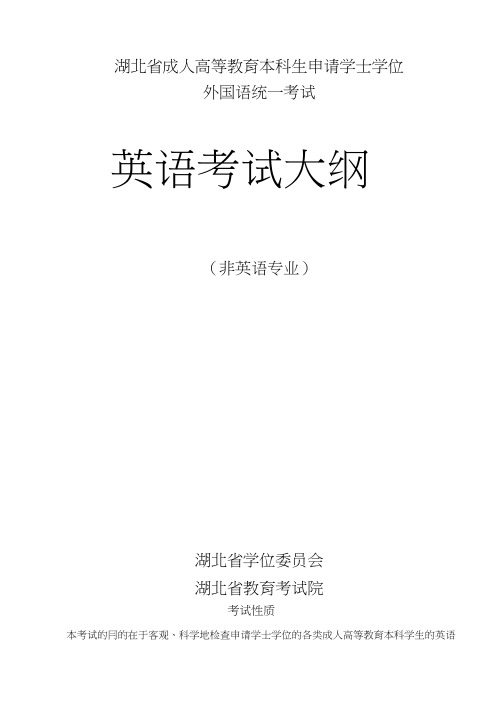
湖北省成人高等教育本科生申请学士学位外国语统一考试英语考试大纲(非英语专业)湖北省学位委员会湖北省教育考试院考试性质本考试的冃的在于客观、科学地检査申请学士学位的各类成人高等教育本科学生的英语语言基础知识及运用能力,促进我省各类成人髙等教育本科学生提高其英语学习水平。
考试对象为申请学士学位的非英语专业的各类成人高等教育本科生。
本考试由湖北省教育考试院统一管理。
考试内容本考试由五个部分组成:词汇与结构,阅读理解,完形填空,英译汉及短文写作,满分为120分,其中70分为客观性试题,50分为主观性试题。
全卷分为第I卷和第II卷。
第I卷包括词汇与结构、阅读理解、完形填空,共50小题。
第II卷包括英译汉及短文写作:英译汉(5小题),短文写作(1篇)。
全卷考试时间共计120分钟,全卷试题按顺序统一编号。
第I 卷第一部分词汇与结构(Part I. Vocabulary and Structure):主要测试考生运用词汇、短语、及语法结构的能力。
共20小题,每题由一个不完整的句子及A、B、C、D四个选项组成,考生应从四个选项中选出一个使该句完整、正确。
第二部分阅读理解(Part II. Reading Comprehension ):主要测试考生能否掌握所读材料的主旨和大意,了解说明主旨和大意的事实和细节;能否在理解字面意思的同时,根据所读材料进行一定的判断和推论;能否在理解个别句子意义的同时,也理解匕下文的逻辑关系。
共20小题,要求考生有一定的阅读速度阅读若干篇短文。
篇章阅读量为1200词左右。
每篇短文后有若干个问题,考生应根据短文内容从每题的四个选择项中选出一个最佳答案。
选材的原则是:1.题材广泛,所涉及的背景知识应为学生所理解,包括人物传记、社会、历史、地理、曰常用语、科普常识等。
2.体裁多样,可以包括叙述文、说明文、议论文等。
3.文章语言难度适中。
无法猜测而又影响理解的关键词用汉语注明词义。
第三部分完形填空(Part III. Cloze):。
- 1、下载文档前请自行甄别文档内容的完整性,平台不提供额外的编辑、内容补充、找答案等附加服务。
- 2、"仅部分预览"的文档,不可在线预览部分如存在完整性等问题,可反馈申请退款(可完整预览的文档不适用该条件!)。
- 3、如文档侵犯您的权益,请联系客服反馈,我们会尽快为您处理(人工客服工作时间:9:00-18:30)。
湖北省博士研究生入学考试(非英语专业)
英语联合考试大纲
Ⅰ考试性质
湖北省博士研究生入学考试(非英语专业)英语联合考试,由湖北省部分博士研究生招生单位联合创办、湖北省教育考试院承办,它通过为我省高等学校、科研院所招收博士研究生提供英语科目的入学水平测试,检验考生是否具有进入攻读博士学位阶段所需的英语水平和英语应用能力,为各高等学校、科研院所选拔优秀人才服务。
因此,该考试应有较高的考试效度,适当的难度和必要的区分度。
本项考试是按照标准化测试要求设计的。
Ⅱ考试内容和要求
根据博士研究生招生单位对招收新生文化素质的要求,参照各博士招生单位制定的培养方案,并考虑研究生教育的实际,制订本学科的考试内容。
本考试共分五个部分:阅读理解(40 %)、完形填空(10 %)、英译汉(15 %)、汉译英(10%)、写作(25 %)。
听力和口语可放在复试中进行。
第一部分阅读理解(Part I Reading Comprehension)
阅读理解部分主要测试考生在规定的时间内通过阅读获取信息的能力,既要求准确,也要求有一定的速度。
本部分主要测试下述能力:
1. 掌握所读材料的中心思想、主要内容和有关细节;
2. 对所读材料的内容进行正确的判断和推理;
3. 根据上下文的逻辑关系理解某些词和句子的意义;
4. 领会作者的观点和判断作者的态度。
阅读材料的选择原则:
1. 题材广泛,可以包括社会、文化、科普知识、史地、人物传记等。
所涉及的背景知识应能为考生所了解;
2. 体裁多样,可包括叙事、议论、描述、说明、应用文等;
3.文章应有一定的难度。
共20题,每小题2分,总计40分。
阅读五篇文章,阅读量为2300-2500个单词。
每篇文章后有4道选择题,共计20题。
考生应根据文章内容从每题所给的四个选项中选出一个最佳答案。
第二部分完形填空(Part II Cloze)
完形填空部分主要测试考生在语篇水平上的理解能力和实际运用语言的能力。
测试的形式是在一篇题材熟悉、难度适中的短文(约150-180词)中留出20个空(第一句和最后一句不留空),每个空为一题,要求考生就所给篇章后所给各题的四个选项中选出可以填入空白处的一个最佳答案。
该部分共20小题,每小题0.5分,总计10分。
第三部分英译汉(Part III E-C Translation)
英译汉部分主要测试考生在英语语篇水平理解基础之上对某些具体内容的准确理解并译成汉语的能力。
测试的形式是从一篇约400-500词的短文中划出三句或三小段,要求考生译成汉语。
测试内容为一般性或科普常识性的短文。
译文须忠实于原文,表达正确,语言流畅。
该部分共3小题,每小题5分,总计15分。
第四部分汉译英(Part IV C-E Translation)
汉译英部分主要测试考生将汉语译成英语的能力。
测试内容为一般性或科普常识性的短文,总量为一篇130-160汉字的中文段落,内含6-8个汉语句子,要求考生译成英语。
译文须忠实于原文,表达正确,无重大语言错误。
该部分共1题,总计10分。
第五部分写作(Writing)
写作部分主要测试考生用英语书面表达思想的能力,要求其写出一篇150词左右的应用型短文和一篇200词左右的非应用型短文。
应用型短文的形式可以是申请信、推荐信、个人陈述等,文中不应出现任何和考生相关的信息;非应用型短文的形式可以有命题作文,主题作文、图表作文等。
应用型短文写作一般应有写作要求;非应用型短文写作一般提供写作提纲。
应用型短文写作和非应用型短文写作均要求切题、能正确表达思想、无重大语言错误。
该部分共2题,第一题为10分,第二题为15分,总计25分。
- 1 -
Ⅲ考试形式与试卷结构
1. 答卷方式:闭卷、笔试。
2. 考试时间:180分钟。
试卷满分为100分。
3. 题型:试卷一般可包括阅读理解题、完形填空题、英译汉题、汉译英题、写作题等题型。
4. 试题难易比例:试卷包括容易题、中等题和难题,以中等题为主。
5. 试卷题型、题量、计分和答题参考时间如下表所示:
Ⅳ参考书目
1. 相当于大学英语5-6级水平的教材;
2. 《研究生英语词汇表》(上海市学位委员会办公室、国务院学位委员会办公室编,同济大学出版社)
- 2 -。
